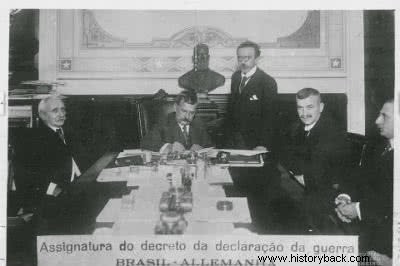The participation of Brazil in the First World War was established in April 1917, after the Germans had sunk Brazilian ships.
Six months later, Brazil declared war on the German Empire and sent nurses, doctors and aviators who carried out observation missions in the Mediterranean Sea.
Historical Context
When World War I broke out on July 28, 1914, Brazil adopted a neutral stance on August 4, 1914. The Brazilian position followed the US decision, which also declared neutrality in the first phase of combat.
The Brazilian attitude reflected the diplomatic trend initiated with Marshal Hermes da Fonseca (1850 - 1923) at the head of the Ministry of War.
There was an intense political and commercial exchange between Brazil and Germany. Brazil sent Brazilian officers to serve in the German Army, which was considered the best prepared and organized at the time. For its part, the Brazilian government acquired weapons from German companies.

In addition, the country had a considerable amount of German immigrants in the south of the country. Therefore, Brazil understood that there was no reason to get involved in the European conflict.
Read more World War I
Declaration of War on Germany
The change in posture began on April 11, 1917, after a German submarine torpedoed and sank the Brazilian ship Paraná. As a result, Brazil broke diplomatic relations with Germany.
In May of that year, two more Brazilian commercial ships were torpedoed off the coast of Europe, the "Tijuca" and the "Lapa" .
The sinking of the vessels caused enormous popular commotion and public opinion welcomed the declaration of war on Germany.
In response, Brazil confiscated 45 merchant ships that were anchored in national ports.
The Germans would attack the freighter "Macao" , and would arrest a Brazilian commander off the coast of Spain. Therefore, on October 26, 1917, the country adopted a belligerent position.
In a state of war, the Brazilian government prohibited the country's Germans from any type of foreign trade.
President Wenceslau Braz sanctioned the Law of War on November 16, 1917. Among other retaliations, licenses that allowed German-owned banks and insurance companies to operate were revoked.

Participation
Brazil was the only South American country to enter the war as a combatant. The governments of Bolivia, Ecuador, Uruguay and Peru limited themselves to breaking diplomatic relations with Germany.
Chile, Mexico, Venezuela, Paraguay and Argentina remained neutral.
At war, Brazil sent to combat on May 16, 1918, a naval division with vessels from Rio Grande do Sul, Bahia, Paraíba, Rio Grande do Norte, Piauí and Santa Catarina.
Brazil also assisted in aerial combat by carrying out reconnaissance missions and providing medical assistance to wounded soldiers.
The government of President Delfim Moreira sent a delegation to act at the Peace Conference, held in Versailles in 1919. The Treaty of Versailles would be signed there.
Brazil asked for financial compensation for the losses of the sunken vessels. As compensation, he managed to transfer the German ships confiscated during the war to the Brazilian State.
He also participated in the implementation of the League of Nations, precursor of the UN (United Nations).
World War I - All MatterRead more:
- Causes of World War I
- Consequences of the First World War
- Phases of the First World War
- Main Battles of World War I
- Trench Warfare
- Triple Alliance
- Triple Entente
- All About World War I
